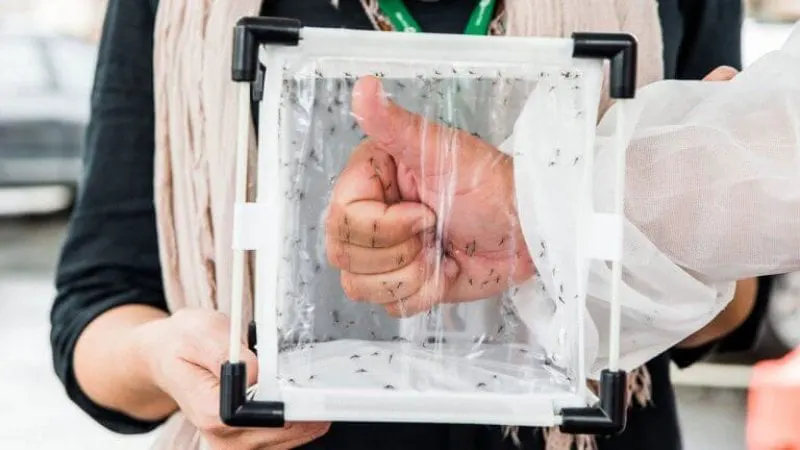‘Now they’re here’: Genetically engineered mosquitoes could help control dangerous spread of disease-carrying Aedes aegypti
‘Now they’re here’: Genetically engineered mosquitoes could help control dangerous spread of disease-carrying Aedes aegypti


Anthony James, who researches disease-spreading insects, never encountered the aggressive mosquito species, Aedes aegypti, when he grew up in Southern California decades ago.
“Now, they’re here,” James, a molecular biologist at the University of California, Irvine, told Mashable.
“Biological control is a great way to go,” emphasized James. Here are the merits of this biological control strategy:
1. Avoids spraying pesticides: When pest control agencies spray pesticides, they’re inevitably killing unintended species. “All these pesticides we’re spraying have serious collateral damage,” Sharon Bewick, an assistant professor of biological sciences at Clemson University, who also has no involvement with Oxitec, told Mashable.
…
2. Not harming native species: The Oxitec mosquitoes aim to only kill the invasive species Aedes aegypti. It’s true that native mosquitoes, while annoying pests to us, play a vital role in the natural food web. Birds, for example, devour mosquitoes. But Aedes aegypti aren’t a native species nor a critical player in the natural North American ecosystem.
3. They’re non-biting males:Only female mosquitoes bite. The modified mosquitoes are males, meaning the trials aren’t releasing more biting insects into places where people live.
This is an excerpt. Read the original post here.

 | Videos | More... |

Video: Nuclear energy will destroy us? Global warming is an existential threat? Chemicals are massacring bees? Donate to the Green Industrial Complex!
 | Bees & Pollinators | More... |

GLP podcast: Science journalism is a mess. Here’s how to fix it

Mosquito massacre: Can we safely tackle malaria with a CRISPR gene drive?

Are we facing an ‘Insect Apocalypse’ caused by ‘intensive, industrial’ farming and agricultural chemicals? The media say yes; Science says ‘no’
 | Infographics | More... |

Infographic: Global regulatory and health research agencies on whether glyphosate causes cancer
 | GMO FAQs | More... |

Why is there controversy over GMO foods but not GMO drugs?

How are GMOs labeled around the world?

How does genetic engineering differ from conventional breeding?
 | GLP Profiles | More... |

Alex Jones: Right-wing conspiracy theorist stokes fear of GMOs, pesticides to sell ‘health supplements’




 Viewpoint — Fact checking MAHA mythmakers: How wellness influencers and RFK, Jr. undermine American science and health
Viewpoint — Fact checking MAHA mythmakers: How wellness influencers and RFK, Jr. undermine American science and health Viewpoint: Video — Big Solar is gobbling up productive agricultural land and hurting farmers yet providing little energy or sustainabilty gains
Viewpoint: Video — Big Solar is gobbling up productive agricultural land and hurting farmers yet providing little energy or sustainabilty gains Fighting deforestation with CO2: Biotechnology breakthrough creates sustainable palm oil alternative for cosmetics
Fighting deforestation with CO2: Biotechnology breakthrough creates sustainable palm oil alternative for cosmetics Trust issues: What happens when therapists use ChatGPT?
Trust issues: What happens when therapists use ChatGPT? California, Washington, Oregon forge immunization alliance to safeguard vaccine access against federal undermining
California, Washington, Oregon forge immunization alliance to safeguard vaccine access against federal undermining 30-year-old tomato line shows genetic resistance to devastating virus
30-year-old tomato line shows genetic resistance to devastating virus The free-range chicken dilemma: Better for birds, but with substantial costs
The free-range chicken dilemma: Better for birds, but with substantial costs ‘You have to treat the brain first’: Rethinking chronic pain with Sanjay Gupta
‘You have to treat the brain first’: Rethinking chronic pain with Sanjay Gupta
